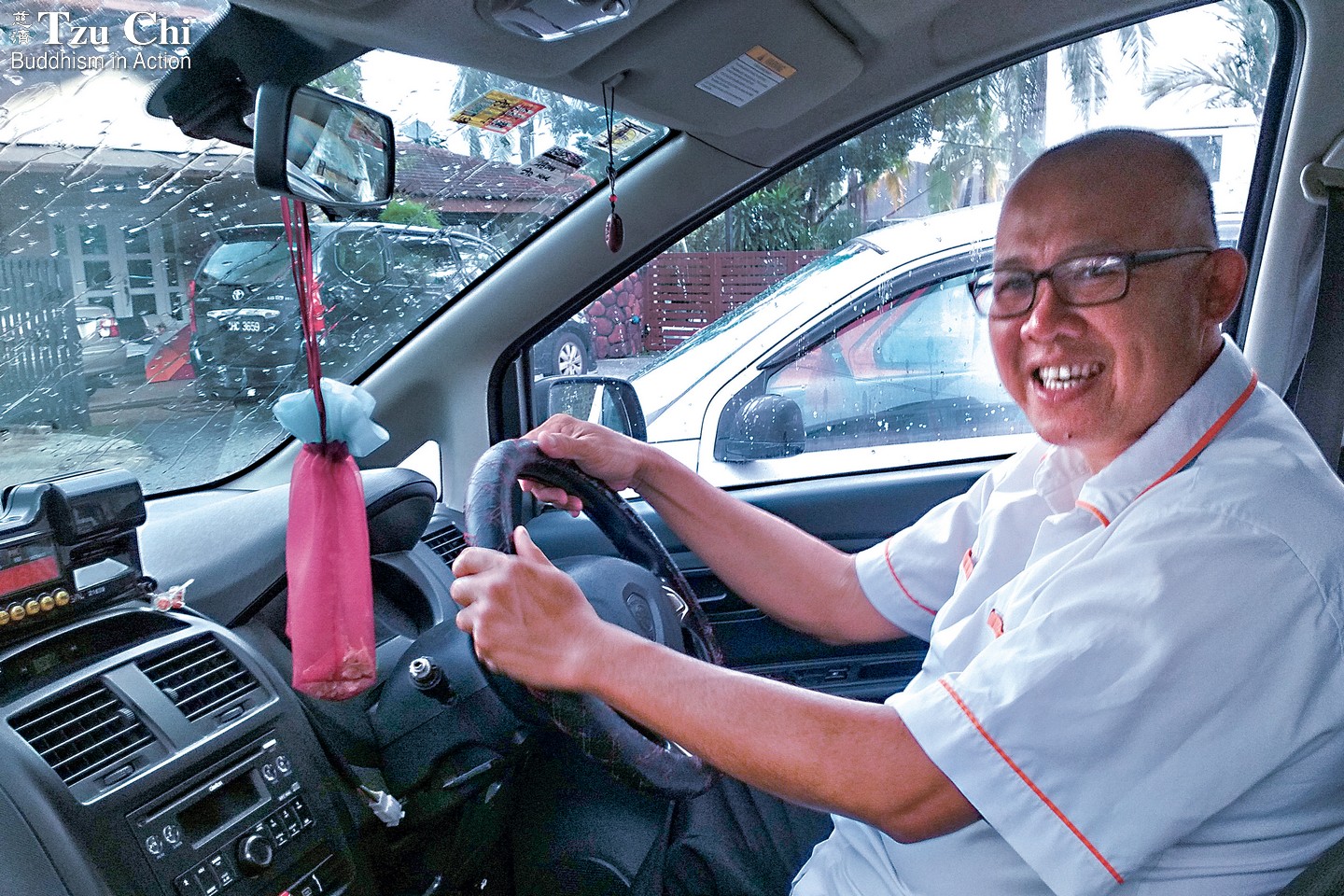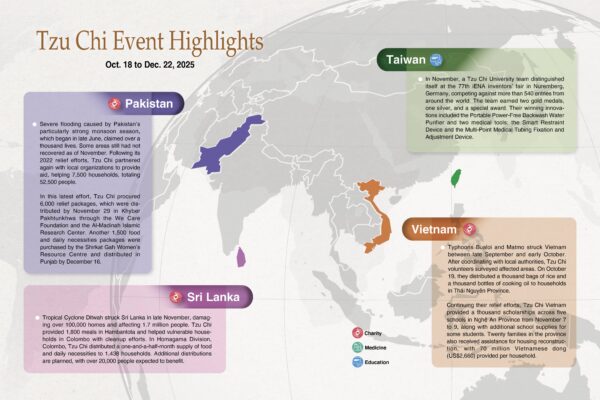By Yap Chai Hoon
Translated by Tang Yau-yang
Photos by Ho Wei Mee
Some Tzu Chi volunteers in Malaysia are among those whose livelihoods have been affected by the precautionary measures enforced by the Malaysian government to arrest the spread of COVID-19. How have they been getting along?
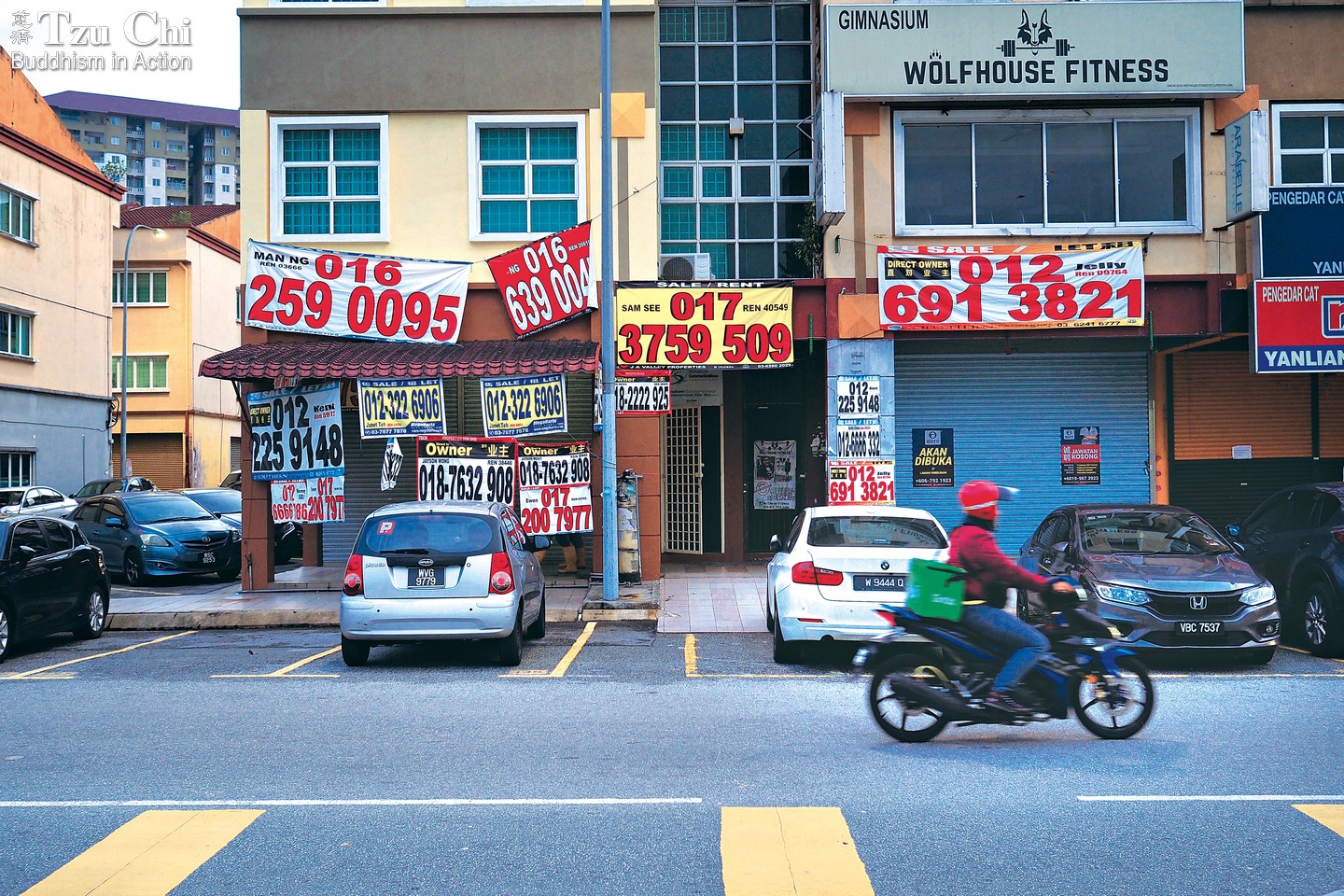
Stores that couldn’t stay afloat after the Malaysian government implemented preventive measures to curb the coronavirus are freed up for rent. SAM PIN FOOK
The raging COVID-19 pandemic has caused a recession in Malaysia more severe than that in the aftermath of the 1997 Asian financial crisis or the Great Recession of 2007–2009. To rein in the spread of the virus, the Malaysian government implemented a Movement Control Order (MCO) on March 18, 2020. The order shut down businesses across the board unless they were providing essential services, such as medical care, logistics, food, and banking. Many companies put their employees on unpaid leave, cutting off their incomes and throwing their lives into disarray. As a result of this lockdown measure, unemployment shot up quickly, from 610,000 people in March to 820,000 in May. The service industry bore most of the brunt. It was anticipated that the employment picture would improve in the second half of the year, with the implementation of the Recovery Movement Control Order in early June. This allowed businesses to gradually reopen and call people back to work. Before the economy really bounced back, however, many people still needed to figure out how to get through the dark days before the end of the tunnel.
Ong Kar Ling (王嘉苓) had run her travel agency for ten years when her business started feeling the pinch of the pandemic in January 2020. That was when her customers began canceling their orders or postponing their travels in droves. At her wits’ end, she had no choice but to send her only employee, a part-timer, home. Even so, she wasn’t too concerned when the MCO was initiated in March. She stayed home binge-watching TV dramas, enjoying some relaxing downtime. But then the MCO was extended, again and again. With each extension, her panic grew more acute. She knew that her office rent came due with an unbending regularity, MCO or not, and that the repayments on her loans were scheduled to start in just six months. Nobody knew with any certainty when the pandemic would come to an end, but she knew beyond a doubt that her revenues were drying up. Where was she going to find the money to make those payments?
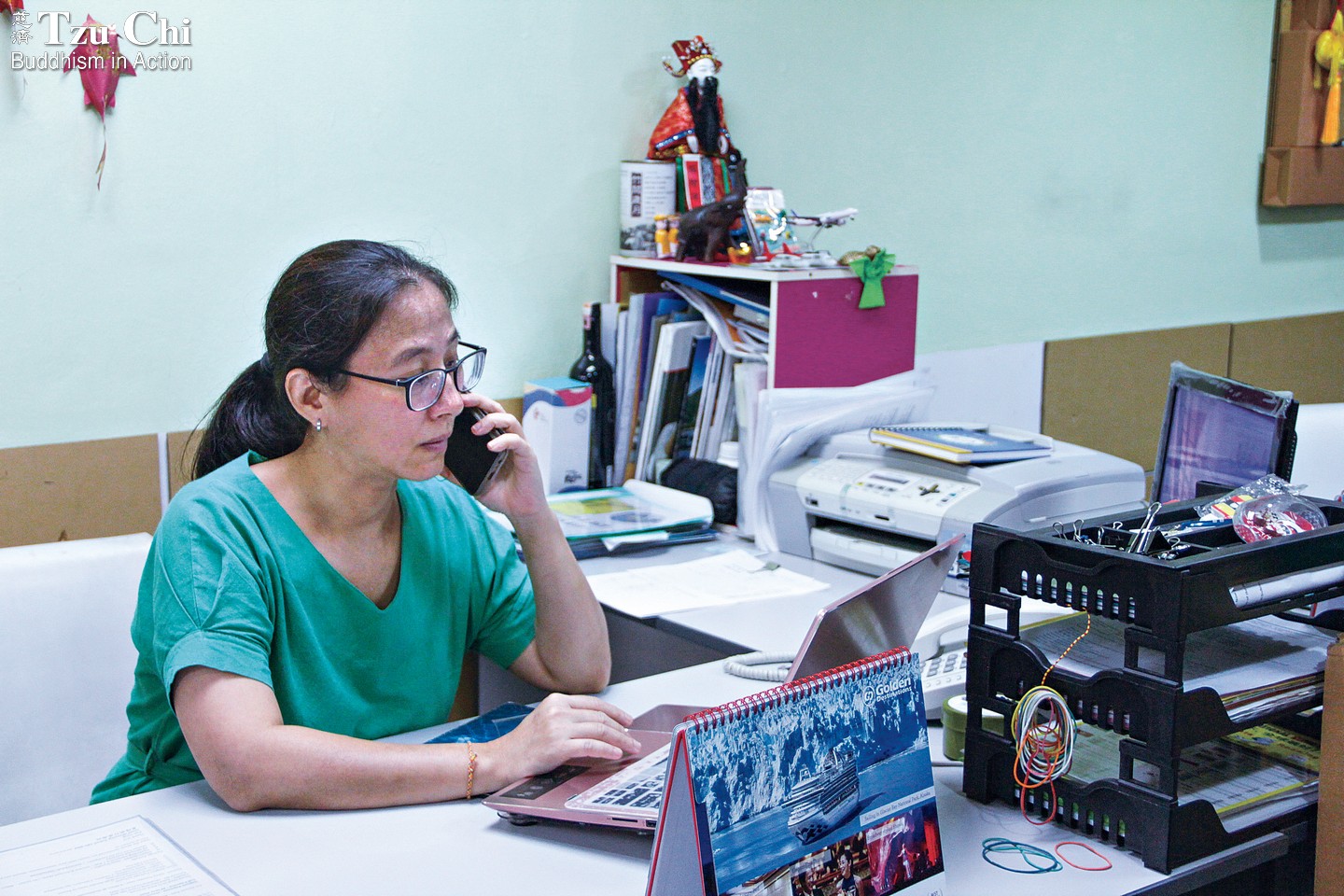
The pandemic has dealt a heavy blow to the tourism industry, in which Ong Kar Ling used to work. She had no choice but to find another way to earn a living.
Rise early for new work
It was only 4:30 in the morning, but Ong was already bustling around in her kitchen. She hadn’t had breakfast yet, but that would have to wait. She needed to get 50 orders of Mee Jawa (Java noodles) ready for lunch delivery to customers at two locations. She had to make the best use of her time. Steam billowed up from pots and pans as sweat broke out on her forehead. Luckily, her mother and best helper, Tan Saw Keok (陳淑季), soon joined her to help out.
“Are the ingredients ready?” Tan asked as she tied a kerchief around her head and got ready to fry some vegetable crepes. Soon after, Ong’s sister also came into the kitchen to help. The mother and daughters sliced potatoes, shredded lettuce, halved eggs, and cut dried tofu. As they worked, the sun gradually crept into the kitchen. At 8:30, they began packing what they had prepared into serving containers. They put lettuce and bean sprouts on one side, added boiled noodles next to the vegetables, then piled potatoes, dried tofu, vegetable crepes, eggs, and calamansi on top of the noodles. A little chili sauce and crushed peanuts were sprinkled on the food as a finishing touch. By the time it was done, the combination of ingredients made a colorful and eye-catching picture.
“We make the soup last,” explained Ong. “Otherwise, the food will get cold by the time we hand it to the customer.”
Everything was ready to go at eleven o’clock. Because it was a weekend, Ong’s husband was at home. He drove her to deliver the orders to the customers. They finished their last delivery at one o’clock, then headed back home.
It had been two months since Ong switched from tourism to running a food delivery business. She and her family had worked out the kinks and figured out ways to get the job done more efficiently. Her kids loved that because they were consequently not needed to help in the kitchen as much as before. Mee Jawa is a traditional Indonesian food which Malaysians love to eat, too. For Ong, every ingredient and every step of the preparation is serious business. On the days when she makes Mee Jawa, she has to get up earlier than usual. “I never needed to rise so early in my earlier job,” she said, smiling.
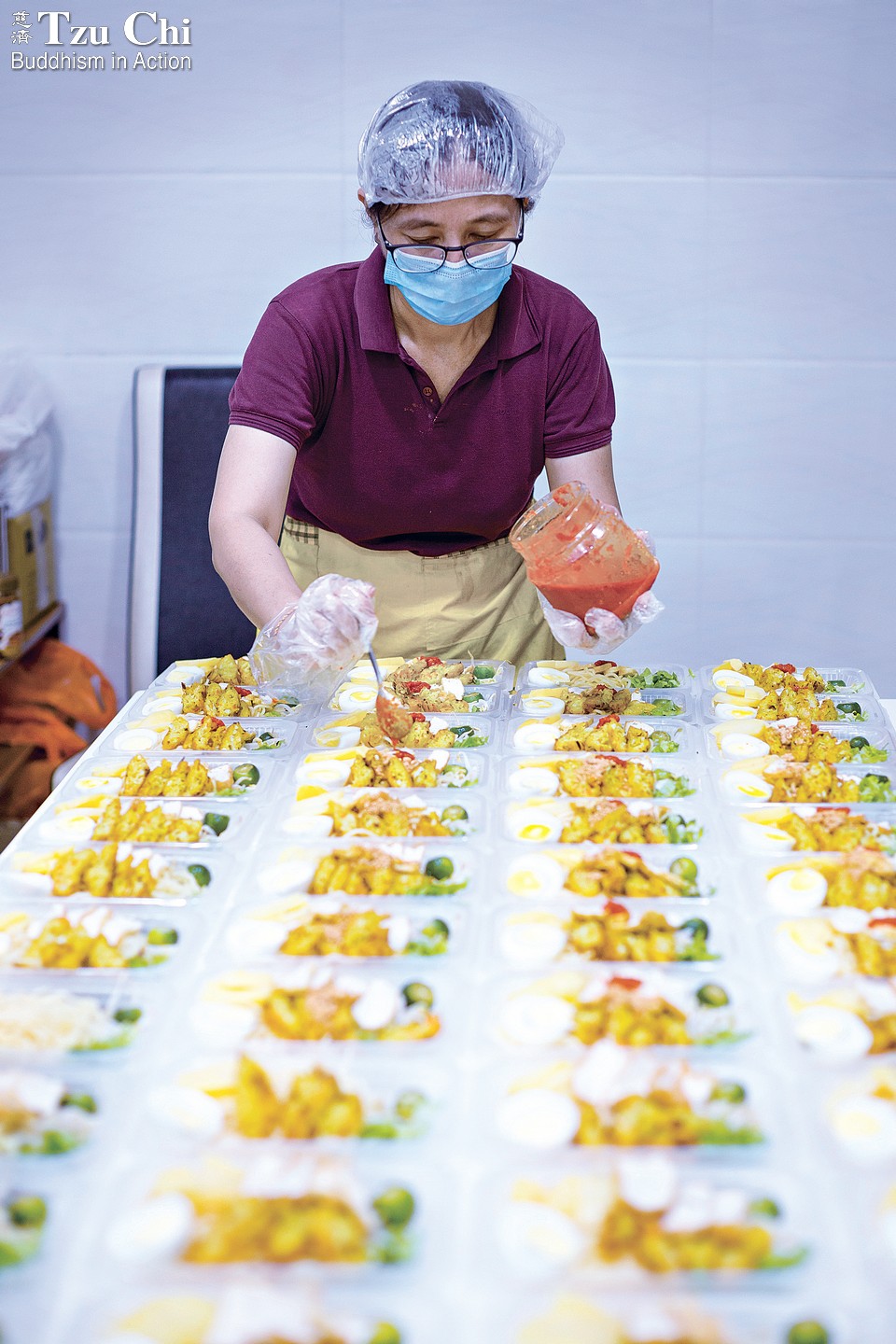
Ong Kar Ling and her family started a homemade food delivery business after the pandemic forced her to switch to another line of work. The family’s food business brings in income while allowing them to advocate vegetarianism.
A way to promote vegetarianism
Though forced to leave the tourism industry, Ong considered herself fortunate because the pandemic did not impact her husband’s job. They could still make ends meet and continue sending their two children to a Chinese independent high school.
Still, Ong knew deep down that idleness would deplete even a great mountain of fortune, so she combed through the classified ads to try to find a new job. She discovered to her dismay that despite her 20-plus years of experience in the tourism industry, it was quite a challenge for her to find work in another field.
In fact, Ong wasn’t too confident in her abilities. Some friends in tourism invited her to rent a space in a food court to sell food together, but she declined. She held back because she thought too much. “Looking back now,” Ong said, “I wonder what I was afraid of. Was it because I had never done it before and wouldn’t have known how to go about it in the first place? But, come to think of it, if I don’t do anything, nothing will ever come of it.”
The Ong family once ran a coffee shop. Falling back on that experience, Ong talked to her mother and sister about starting a homemade food delivery business. They publicized their service on social media and got a good response. They started taking in some money by selling homemade food. An added benefit was that such a service would allow them to promote vegetarianism.
Their business offers free delivery in the Klang District, where they live, if a customer orders at least two vegetarian meals. Customers living in other areas need to order at least four meals to have the delivery fees waived. “I know other people charge more for their food, but this work is about more than money,” Ong said. “As long as customers want vegetarian food, I’m glad to make it for them. I want to help Master Cheng Yen promote vegetarianism.”
Though the business requires the joint effort of several family members to operate, Ong’s home-based business earns an income that is only a third as much as what she used to make alone. Even so, the family decided to donate part of their earnings to Tzu Chi to help the needy. They were upholding the spirit of “If you take from society, give back to society.” Out of every meal they sell—priced at six ringgit (US$1.45)—they donate 50 cens (12 U.S. cents) to Tzu Chi.
Ong’s mother, Tan, began volunteering for Tzu Chi ten years ago. She is most supportive of her daughter. “We have a little income, so we have no problem helping others,” she said. “I believe that the ripples of goodness will come back full circle to us.”
If the mountain will not come to me
The coronavirus was under much better control in Malaysia by July. Schools and more businesses reopened as a result, but the borders remained closed. Tourism remained depressed, so Ong stopped leasing the office space for her travel agency. She would wait and see what might come along next.
Like tourism, the entertainment industry has been hard hit by the pandemic. Volunteer Ho Wing Hong (何永康) had been in the karaoke business for many years when the pandemic hit, but even his once stable business went south. He was forced to close three stores. For the first time in his life, Ho, in his fifties, felt uncertain about what the future might hold for him. He kept reminding himself not to lose hope.
In July, he and his wife started an online flower shop. They had to learn as they went, but they didn’t mind. “Perhaps this is a test for us from heaven,” he said. “Problems and challenges are opportunities for growth. If we can adjust our mindsets and change our approaches, there will be no dead end.”
Ho has even found a silver lining in the cloud of the pandemic. With more time on his hands now, he can volunteer more frequently for Tzu Chi. He serves as a documenting volunteer by videotaping Tzu Chi events. He said that if he constantly dwelt on his livelihood, he wouldn’t be able to sleep soundly, so he might just as well use the time he has to volunteer for Tzu Chi. After the pandemic erupted, he helped videotape Tzu Chi distributions for refugees and foreign laborers. “Having witnessed their plight, I feel I’m a much more fortunate person.”
Many refugees and foreign laborers are paid by the day. The lockdown measures really put them in a tight spot. With no incomes, they faced the imminent danger of hunger and homelessness. Ho has seen some of them, their eyes welling with tears, ask Tzu Chi volunteers for help. Their landlords were threatening to evict them if they didn’t pay their rents.
Chay Sie Wai (謝小慧) helped with aid distributions for refugees by conducting telephone interviews with them. She had lost her job in April, but was lucky enough to land a new one later. “Though I get paid less than before, it’s better than sitting around idly at home doing nothing,” she said. Charity work has helped her feel content with her own lot. Though she needs to draw on her savings, she feels she is getting along well enough. “I’m very grateful,” she said of her current situation in life.
Tee Chee Guan (鄭智源) has volunteered actively in Tzu Chi distributions since the pandemic broke out. He drove a taxi before the pandemic, mainly taking people to and from the airport. His livelihood has been severely impacted by the coronavirus, but government subsidies have been adequate to sustain his family. “I’ve used this opportunity to take part in more charity work,” he said. “I hope to use my actions to teach my children that whenever you can help others, you should do your best.”
With his taxi business impacted by COVID-19, Tee Chee Guan makes good use of his time by volunteering more frequently for Tzu Chi. COURTESY OF TEE CHEE GUAN
